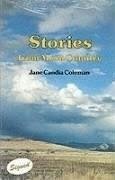A first collection of 14 stories that peoples a southwestern landscape with female survivors of one kind of abuse or another. At her best, Coleman can evoke the haunted landscape and the domestic discord of a Frostian dramatic poem or the passionate bitterness of a Lawrentian short story. "Sunflower" concerns a female narrator and her husband Clay, who have found a weary acceptance of each other after her passionate youth and catastrophic tryst with young lover Miguel ("I never felt I could ask him [Clay] where the joy went..."). Likewise, in "The Voices of Doves," the narrator, a bereaved mother who lost her infant - one of many children - when her illiterate helper oiled the baby accidentally with carbolic acid, reaches a reconciliation with the girl after a lonely recognition of a kind of fate that is bound up in the land: "There is a violence in this soil, in the people who labor on it." "Mesa Country," on the other hand, is sparse and Lawrentian: "We live in tumult. Everyone." Other stories are more typically feminist and lyrical in their intent and execution: "The Paseo" lovingly evokes in "a silent marketplace" a promenade of women "wrapped around their pearls" and a male narrator who wants to paint one of the young beauties, but whose downfall involves both the local culture and his own unacknowledged desires. In "The Ugliest Woman in the World," the narrator runs off with wild macho man Buck, only to come to her senses, faced with his selfishness, and leave him. A woman in "Acts of Mercy" rides off on a horse to help a neighbor faced with wild clogs - the men here are absent and finally unnecessary. Coleman's stories - some published in such journals as South Dakota Review and Puerto Del Sol - evoke a harsh natural and man-dominated world where women sometimes become strong through their suffering. (Kirkus Reviews)
Hinweis: Dieser Artikel kann nur an eine deutsche Lieferadresse ausgeliefert werden.
Hinweis: Dieser Artikel kann nur an eine deutsche Lieferadresse ausgeliefert werden.








